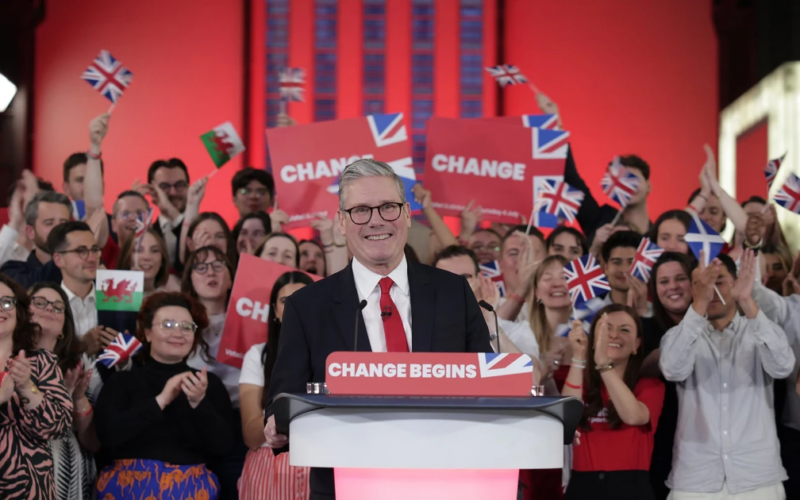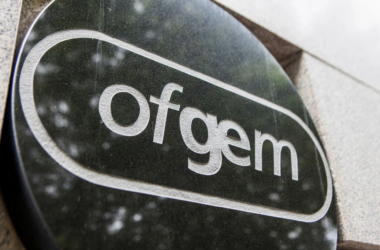Labour Triumphs in Historic Election, Ends 14 Years of Conservative Rule
In a decisive general election, the Labour Party has secured a commanding majority, marking the end of a 14-year Conservative government. Labour’s leader, Sir Keir Starmer, is set to become Prime Minister, bringing an era of significant political change.
Election Results and Labour’s Historic Win
Labour’s landslide victory saw the party win 412 seats, a dramatic increase from their previous standing, while the Conservatives plummeted to just 120 seats. The Liberal Democrats gained 71 seats, and smaller parties like Reform UK and the Green Party secured four seats each. This shift is the most substantial since Labour’s landslide under Tony Blair in 1997, though it does not surpass the 179-seat majority Blair achieved.
Keir Starmer’s Vision for the Future
Sir Keir Starmer, who will be appointed Prime Minister later today, has pledged a “national renewal,” emphasizing a focus on revitalizing the country’s institutions and addressing key issues. In his victory speech, he committed to prioritizing the country over party politics and expressed his dedication to renewing the principles that unify the nation.
“We have earned the mandate to relight the fire,” Starmer told supporters in London, indicating a departure from the recent political turbulence.
Conservative Party’s Defeat and Reaction
During their 14-year tenure, the Conservative Party went through five different leaders, each contributing to a steady decline in public support. The downward trend culminated with Prime Minister Rishi Sunak, whose electoral campaign is widely regarded as one of the worst in recent memory. Sunak’s tenure ended in a decisive defeat, a point underscored by the actions of independent candidate Niko Omilana, who held up a mocking “L” sign during Sunak’s concession speech.
Despite this, Sunak accepted full responsibility for the historic loss. “The Labour Party has won this general election, and I have called Sir Keir Starmer to congratulate him on his victory,” he stated. “The British people have delivered a sobering verdict tonight. There is much to learn and reflect on, and I take responsibility for the loss. To the many good, hard-working Conservative candidates who lost tonight—despite their tireless efforts, their local records of delivery and their dedication to their communities—I am sorry.”
Sunak’s campaign was marred from the beginning, starting with his announcement of a snap general election outside No. 10 Downing Street during a torrential downpour, soaking his expensive suit and drowning out his words with an old Labour anthem blared by a protester. The campaign only deteriorated from there, notably when Sunak left a D-Day memorial in France prematurely, leaving Presidents Joe Biden and Emmanuel Macron to honor the veterans alone.
Outgoing Prime Minister Rishi Sunak conceded defeat early Friday morning, congratulating Starmer on Labour’s victory. Sunak acknowledged the overwhelming mandate given to Labour and noted the need for the Conservative Party to reflect and regroup following what former minister Robert Buckland described as “electoral Armageddon.”
The election marks the worst result for the Conservatives in nearly 200 years, leading to an imminent battle over the party’s future direction.
What Happens Next?
Transition of Power
The transition to the new government will be swift. Sunak is expected to offer his resignation to King Charles III at Buckingham Palace, after which Starmer will be invited to form the next government. Starmer’s walk up Downing Street and subsequent address from Number 10 will be a pivotal moment, setting the tone for his administration.
Forming a New Cabinet
Starmer will quickly assemble his cabinet, appointing top Labour MPs to key positions. The new Parliament will convene on July 9 to elect the Speaker of the House of Commons, followed by the swearing-in of MPs. The King’s Speech on July 17 will outline the government’s legislative priorities.
Labour’s Agenda and Policy Focus
Labour’s victory promises a shift in policy, with Starmer emphasizing plans to revive the economy and improve public services. He has vowed not to raise taxes on working people, instead aiming to close tax loopholes and end certain tax breaks to fund these initiatives. Labour’s strategy, while focused on pragmatic solutions, will be closely scrutinized by economists for its effectiveness in driving growth.
Impact on UK Politics and International Relations
Labour’s rise to power is not expected to alter the UK’s relationship with the United States significantly, maintaining strong ties on defense and trade. However, Labour’s alignment with the current US administration suggests a potentially smoother bilateral relationship.
Notable Election Outcomes and Trends
Key Conservative Defeats
The election night saw prominent Conservative figures, including former Prime Minister Liz Truss and ex-Business Secretary Jacob Rees-Mogg, lose their seats. The defeat of multiple Conservative cabinet ministers reflects the electorate’s desire for change.
Labour’s Challenges and Losses
Labour also faced challenges, notably losing some seats to independent candidates focused on pro-Gaza platforms, highlighting the party’s ongoing struggle with its stance on international conflicts.
Emergence of Reform UK
Reform UK, led by Nigel Farage, gained a small but significant foothold with four seats. Farage’s entry into Parliament introduces a new dynamic, as Reform UK aims to position itself as a conservative alternative in future elections.
Sir Keir Starmer: The New Prime Minister
Starmer, a former barrister and Director of Public Prosecutions, entered politics relatively recently. He has represented Holborn and St Pancras since 2015 and took over Labour leadership after the party’s poor performance in the 2019 election. Starmer’s leadership promises a shift from the left-wing approach of his predecessor, Jeremy Corbyn, toward a centrist strategy aimed at broad national appeal.
Labour’s substantial victory signals a new direction for the UK, with Sir Keir Starmer at the helm. As the country prepares for this political shift, the new government faces the challenge of fulfilling its promises and addressing the issues that led to this historic election outcome. The immediate days will see a rapid transition, setting the stage for Labour’s governance and the future of British politics.








